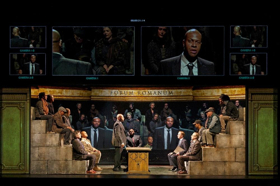Review: The Stratford Festival's Spectacular Production of CORIOLANUS Must Not Be Missed

Over the years, I have had a variety of different thoughts as I walked out of a theatre at the Stratford Festival having just watched a Shakespearean production. I often reflect on how the show made me feel, or the incredible performances I just witnessed, or the creative ways the director made the production his or her own. All of those thoughts certainly crept into my mind in the hours following the opening performance of CORIOLANUS, but Friday night was the first time that I exited the theatre after seeing one of Shakespeare's works where the very first thought that crossed my mind was "That. Was. Cool." The second thought that crossed my mind was "Had the Tom Patterson Theatre been available, would this production have been at the Avon?" If the answer is "no", then thank goodness for construction because the Avon Theatre is exactly where this production needed to be and Robert Lepage is exactly the person who needed to direct it. Again...That. Was. Cool.
In all likelihood, the decision to put on this play at the Avon probably happened as soon as Lepage was onboard as Director and Set Designer. The former movie theatre suits his vision perfectly, as this production is, in one word, (other than "cool") cinematic. With the use of movie credits as the play opens and to introduce each Act, as well as multiple screens that move vertically and horizontally to shape the spaces the action is taking place in, or to act cleverly as doors to an elevator, this production looks and feels nothing short of epic.
CORIOLANUS is the story of a celebrated Roman soldier, Caius Martius Coriolanus (André Sills) whose popularity sours shortly after he enters politics. Rome is introducing a democratic system and public opinion is beginning to matter more, and Coriolanus was raised in a world of Kings and does not have the temperament necessary to be able to adapt to the changing times. When it is clear that he cannot maintain his power, he joins forces with a former enemy to exact his revenge on Rome. The play was originally set in ancient Rome but this production is a modern one. It is definitely set in Rome though, as specific sites such as the Coliseum and the Pantheon are presented on the video backdrop as the settings of certain key scenes. Sound designer, Antoine Bédard cleverly shapes the sound in the room based on the location of the scenes, creating more echoes when characters are speaking in these big open spaces.
As the titular character, André Sills is fantastic. His Coriolanus is strong, stubborn, and passionate, but also damaged from the war he has seen. Near the beginning of the play, he is bloodied from battle and has sustained a head injury. It is never clear how severe the injury is, but it is evident that even if this man's brain is not physically damaged from this time in his life, the mental and emotional turmoil does not fully go away. Like so many soldiers returning from war, he likely has PTSD. This would undoubtedly affect his temperament and his view of the world and would therefore affect how he is as a leader, yet those around him never really seem to take this into account. Sills brings about the complexities in this character masterfully.
Speaking of masterfully portraying a character, another standout is Lucy Peacock as Coriolanus' mother, Volumnia. This relationship between mother and son is no secret to anyone, and is even acknowledged by a random citizen of Rome at the very beginning of the play. She is a significant influence in his life and has shaped many of the views he has. When things do not go their way, and especially when Coriolanus chooses to attack Rome, Volumnia is incensed. This is where Peacock shines. The way she portrays Volumnia's anger and vitriol towards the Tribunes (played by the always excellent Tom Rooney and Stephen Ouimette), and then towards her son when he might not do what she wants him to do-is absolutely captivating.
Other notable performances include that of Graham Abbey, as Volscian General Tullus Aufidius, who is portrayed here as a gay man with a complicated relationship with once-enemy Coriolanus and with his Lieutenant (Johnathan Sousa); Alexis Gordon is heartbreaking as Coriolanus' wife Virgilia; and Tom McCamus and Michael Blake also stand out as Coriolanus' friends Menenius Agrippa and General Cominius, respectively.
There is so much cleverness that goes into the design of this production and I do not want to give it all away, but some highlights include the 'mob' scene in Act I Scene I that has been perfectly re-envisioned for our day and age; a moment of 'child's play' with toy soldiers; a scene where two guards are texting on another; and the scene where Coriolanus drives out of Rome.
Whether you are a Shakespeare fan or not, this is a production at the Stratford Festival that you must not miss.
CORIOLANUS continues in repertory at the Stratford Festival's Avon Theatre until October 20th.
Photo Credit: David Hou
Reader Reviews
Videos

